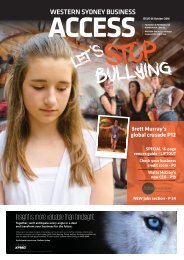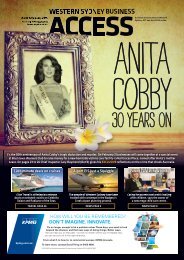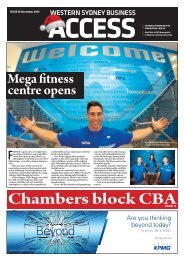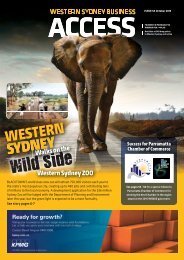RECRUITMENT
WSBA September 2015
WSBA September 2015
Create successful ePaper yourself
Turn your PDF publications into a flip-book with our unique Google optimized e-Paper software.
BF<br />
FAMILY<br />
BUSINESS<br />
WESTERN SYDNEY<br />
WWW.WSBA.COM.AU<br />
Do your FB meetings add value?<br />
MANAGEMENT<br />
A<br />
COMMON misconception in family<br />
businesses is that if they can communicate<br />
effectively amongst the family<br />
members, they are well positioned for<br />
efficiently managing the business and achieving<br />
their goals.<br />
Central to the operation of any business<br />
is bringing the management team together to<br />
work on the business. However, what would<br />
your response be to the following question<br />
regarding meetings in your family business:<br />
On a scale of 1 to 10, rate the value the<br />
meeting adds to the business? In what ways<br />
does it add value?<br />
“Zero”. (Response from a family member<br />
when in meetings with his sibling and parents).<br />
What we often see is the ‘one in, all in’<br />
situation. All the family members coming<br />
together to have their say on everything… and<br />
I mean everything.<br />
The ‘attitude’ of the front reception<br />
person; why cousin Steve should be employed<br />
in the business; the purchase of a new<br />
commercial building; the date and location<br />
of grandma’s 90th birthday; and the declining<br />
trend in monthly profits.<br />
“Our family board meetings run for<br />
about 5 hours. There is a lot of information<br />
but little discussion, debate and<br />
decision making”. (Response from a family<br />
members in board meetings involving 10 family<br />
members)<br />
In frustration to the situation, some family<br />
businesses adopt the ‘us and them’ approach.<br />
Only family members actively working<br />
day to day in the family business meet to make<br />
decisions on the future of the business.<br />
But what about those family members<br />
who are shareholders but not working in the<br />
business? Should they be privy to what is happening<br />
and having a say in the future?<br />
This is where structure is an important<br />
element to success. Structure ensures the<br />
‘right’ people come together in the ‘right’<br />
forum to discuss the ‘right’ things, at the<br />
‘right’ time.<br />
But what is structure?<br />
It is a combination of:<br />
• The right composition of the attendees<br />
– the people who should be<br />
at the table making decisions regarding<br />
the business are those who have<br />
been charged by their stakeholders<br />
(if a board meeting, they are voted<br />
by the shareholders, if a management<br />
meeting, those appointed by the<br />
board and CEO). Having the wrong<br />
composition of people at the table<br />
will destine the meeting to failure.<br />
• Regular meetings with a clear<br />
purpose and agenda – in the family<br />
business we often help families<br />
establish two meetings with clearly<br />
different purposes. One being the<br />
business advisory/board meetings<br />
which focus exclusively on the business<br />
issues and decision making. The<br />
second is a Family Council meeting<br />
which focuses on family issues that<br />
relate to the family business.<br />
• Fewer family members with a<br />
seat at the table – in the context of<br />
the business advisory/board meeting,<br />
those family members with the<br />
appropriate skills, experience and<br />
insights discussing and making business<br />
decisions in the best interests of<br />
the family business, and ultimately<br />
for the wider family. Similarly for the<br />
Family Council, the mix of family<br />
members who represent and make<br />
decisions in the best interests of the<br />
whole family, not just family shareholders.<br />
• Tools and rules – these are important<br />
for any formal gathering of<br />
people to: direct the discussion; set<br />
the boundaries (or guideposts) in<br />
terms of what topics are discussed<br />
and what decisions can be made; and<br />
outline how contentious issues or<br />
scenarios will be resolved. In terms of<br />
a family business these take the form<br />
of Family Rules (or often referred<br />
to as a Family Agreement or Family<br />
Charter).<br />
• Leadership – to set a positive tone<br />
and ensure the meetings are focused<br />
and remain ‘on topic’. Often this<br />
leadership comes from a non-family<br />
member until the family becomes<br />
familiar with the new structure and<br />
meeting behaviours.<br />
In our experience, most families need<br />
support to make the distinction between the<br />
role of the Family Council and the Business<br />
Board of Directors – for many families these<br />
bodies have always been one and the same.<br />
Once the family understands the distinction<br />
and embraces the new structure they<br />
benefit from a non-family member chairing<br />
the meetings so they run smoothly and the<br />
“<br />
Our family board meetings<br />
run for about 5 hours. There<br />
is a lot of information but<br />
little discussion, debate<br />
and decision making”.<br />
Do your FB meetings add<br />
value?<br />
family can focus on new behaviours and new<br />
conservations.<br />
How receptive would your family be to<br />
an independent and objective non-family<br />
member chairing your family meetings?<br />
Another challenge on a daily level is<br />
family members understanding which hat<br />
to wear and when to wear it. Some family<br />
members may have multiple roles in the<br />
family business/es (i.e. they wear multiple<br />
hats). These family members have the added<br />
challenge of recognising which ‘hat’ to wear<br />
in different conversations and making decisions.<br />
“My daughter now runs the day to day<br />
business and I talk to her every day. I need<br />
to stop and think before the conversation:<br />
am I offering advice as a father or am I talking<br />
to her as a shareholder”. (Comment from<br />
a first generation family member).<br />
The trick is to structure and frame the<br />
conversation/communication before going<br />
into it. Now thinking about you… ask yourself<br />
before the next conversation:<br />
• Is it a family topic or an ownership<br />
topic or a business topic?<br />
• Should I be making the decision as<br />
a family member; an owner of the<br />
asset; or an employee/director of<br />
the business?<br />
If family members individually and collectively<br />
exhibit effective communication<br />
and embrace structure then the family is well<br />
on the way to good family governance.<br />
Are your family meetings a one in, all in,<br />
an ‘us and them’ or a clear structure which all<br />
family members understand and observe?<br />
Big business could learn lessons from f amily businesses<br />
EXPERIENCE<br />
BIG business could learn survival lessons<br />
from family businesses, according to a<br />
report.<br />
Family businesses are less likely to<br />
fail than big business because they are usually<br />
made up of a well-functioning and diverse<br />
board of directors who are able to advise effectively,<br />
according to a report published by<br />
researchers from Imperial College Business<br />
School, Leeds University Business School and<br />
Durham University Business School.<br />
The researchers found that family businesses<br />
were less likely to go bankrupt because they<br />
are able to recruit and maintain an experienced,<br />
diverse and knowledgeable board of directors.<br />
The team also found that 80 percent of<br />
family owned businesses are more gender balanced,<br />
having at least one female director.<br />
Professor Mike Wright, Director of the<br />
Centre for Management Buyout Research<br />
(CMBOR) at Imperial College Business<br />
School, said: ”Running a successful business<br />
of any size is no easy task and this year we have<br />
already seen some high-profile businesses<br />
such as Comet being forced to close. Family<br />
businesses could provide lessons to larger<br />
firms, as our findings show that a more diverse<br />
and experienced board of directors, which are<br />
prevalent in family firms, could be related to<br />
reducing failures in businesses.”<br />
The board of directors in a company provide<br />
advice and direction to management. It is<br />
responsible for ensuring that companies fulfil<br />
their mission statement.<br />
They also provide advice to executives if<br />
they see the company drifting away from its<br />
goals and objectives.<br />
The study found that the diversity of the<br />
boards of family businesses means that they<br />
are more stable.<br />
Surprisingly, the team found that this<br />
limits conflict between board members. This<br />
diversity also means that board members have<br />
a wider skill set making them more able to address<br />
potential threats to the survival of family<br />
businesses. This is in comparison to other<br />
private firms where board turnover is higher.<br />
The team found that these boards also ensure<br />
that family firms, which often have to rely<br />
on internal sources for financing of projects,<br />
are more frugal in their spending.<br />
They scrutinise business opportunities<br />
with greater intensity and take fewer business<br />
risks than private firms.<br />
The study highlighted the fact that familyorientated<br />
goals such as preserving unity,<br />
wealth and providing employment for family<br />
members may also contribute to their survival.<br />
To carry out their research, the team<br />
analysed data of over 700,000 medium and<br />
large private family and non-family firms with<br />
at least 50 employees.<br />
20 WESTERN SYDNEY BUSINESS ACCESS SEPTEMBER 2015






